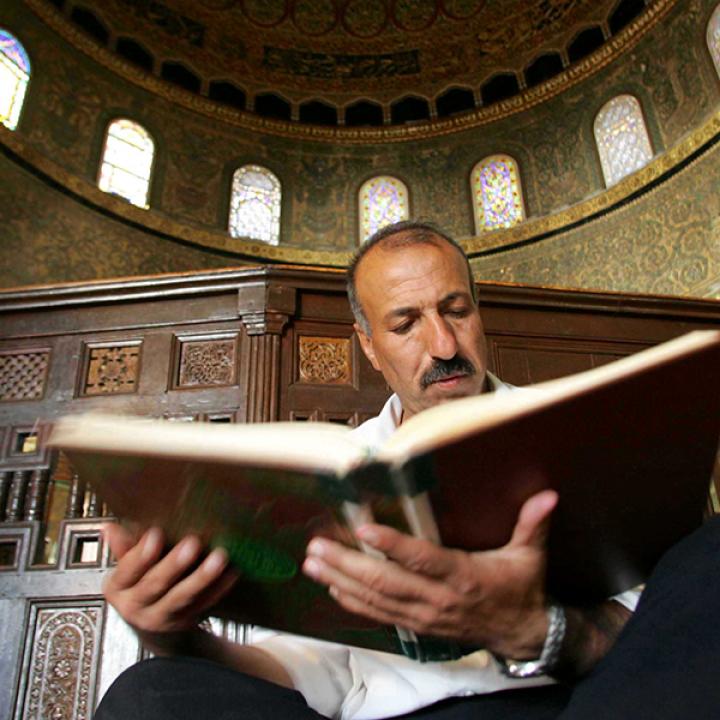
- Policy Analysis
- Fikra Forum
Clarifying the Meaning and Case for Islamic Religious Reform

In my most recent Fikra Forum piece, In Defense of Islamic Religious Reform, I address the need for religious reform in the modern age. In Hassan Mneimneh’s response to my piece, Islamic Religious Reform Is an Institutional Need First, he raises several thoughtful questions regarding Islamic religious reform’s feasibility, and whether pushing it too rapidly may be counterproductive.
In his commentary, Mneimneh concluded that the very notion of religious reform is flawed, as it cannot achieve anything beyond a compromise between the values of Islam and the demands of the times and a piecemeal approach may not bring about the sought-after change. In reality, however, I am not calling for a kind of religious reform that simply compromises between those values and demands.
Mneimneh also characterized my use of the term “religious discourse” to be largely superficial. Rather, my use of the phrase, “reform of religious discourse,” should be interpreted as a call for profound reforms, which involves re-rooting jurisprudential concepts and theories that have developed over time. In other words, I am advocating for the modification of the jurisprudence system, which is amenable to interpretations not explicitly laid out in the Qurʾan, or ijtihad, in order to adapt to modern times. Perhaps “reform of religious thought” is a better way to describe my objectives. However, This phrase is often viewed as contentious, given that some segments of the community see the phrase as a veiled desecration of Islam itself.
The importance for such reform to include the religious institution, which insists on treating the texts of past jurists and mujtahidun as sacred and sacrosanct, cannot be overstated. The mujtahidun themselves have been known to say, “I hold my opinion to be correct, recognizing that it may be incorrect; and hold other opinions to be incorrect, recognizing that they may be correct.” Likewise, the mujtahidun would rather adapt ijtihad according to time and place. mujtahidun laid forth the Islamic legal maxim, “It may not be denied that laws will change with the change of circumstances.” Therefore, they laid forth bases of law known as ‘urf (societal customs), maslaha (public interest), sadd al-dhara’i’ (blocking the means to evil), and siyasa shar’iyya (sharia-oriented policy). The legal framework established by the mujtahidun reveal their recognition of the undeniable reality that religious reform is necessary and unavoidable.
Yet oftentimes we find that many religious institutions have fashioned themselves as guardians of Islamic thought, either through individuals or institutions. The archaic rulings that they rigidly uphold are in need of new, in-depth review to keep up with the changes of the present day. Otherwise, those who do not keep up—including all those who rely upon the same jurisprudential code that has remained the unaltered over the course of the history of Islam—will be left behind. Therefore, I do not see any contradiction by proclaiming the necessity of reform, and what Mneimneh seeks in his article, which is that Islamic religious institution must be reformed before anything else.
I disagree, however, with Mneimeh’s argument, which states that “there may be a silver lining in the gap between this immediate need and the ability of the religious institution to deliver. It reveals that the paternalism of the religious institution over society is neither unavoidable nor imperative.” Delaying reform will not reveal to our societies the masquerade of the religious institution and its custodians; in fact, we may see the opposite result, where this institution roots itself more deeply in the collective consciousness of Islamic societies. As such, the end results of postponing reform efforts would be as damaging to Islamic society as moving too quickly.
The process for renewing Islamic discourse also includes reforming the current educational system, particularly the curricula, which continues to rely on memorization rather than analysis. A starting point for reform requires a greater emphasis on profound thought to promote an open-minded, scholarly atmosphere for young minds to grow. The educational system should evolve from rote memorization, to activities that stress understanding so that students can better interpret natural phenomena, distinguish between partial and complete correlation, form hypotheses, and interpret the grounds for rulings; and, from there, discover the law.
After reforming the current curricula, it must also be enriched with new subjects that lay the foundations for human relationships to create an atmosphere of open-mindedness to change attitudes towards religious dissent and doctrinal disputes. Once this is incorporated into the current curricula, the religious dissenter will be seen as a participant on substantive bases of patriotism and equality that are no less important than what preceded them.
This idea of Islamic religious reform arises from the needs of the age in which we live, in order to adapt to technological and scientific revolutions as well as the epistemological revolution in the structure of knowledge. In my previous article, I touched on the a general framework for reforming religious discourse, so that it exist with modernity. This requires a foundational perspective aimed at building a new system of Islamic thought—one that transcends conflict with modern values and so that Islamic values can coexist as human values. As such, the call for reform must cover all aspects of the “Islamic mindset:” religious, moral, political, economic, and epistemological. Indeed, there is an urgent need for Islamic religious reform in order to develop and adapt to the issues of the present day; such reform is key to bringing about a renewed consciousness in all our societies.


